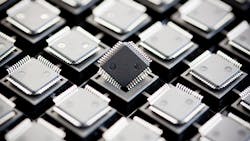Taiwanese Chipmaker TSMC Quarterly Profits Drop
TAIPEI — Chipmaking giant Taiwan Semiconductor Manufacturing Co. (TSMC) announced Thursday that its third-quarter profit fell 1.3% compared to the same period a year ago amid sluggish demand for smartphones and computers.
Its net income in the three months through September slipped to Tw$75.33 billion ($2.35 billion), its first earnings decline in three years, according to Bloomberg News.
The world’s biggest contract microchip producer — which is known to be a supplier of Apple — is seeing earnings slip as it vies with regional rivals such as South Korea’s Samsung and Chinese firms in a globally-weakening smartphone and electronics market.
“Due to a weaker global economy, a stronger U.S. dollar environment and a volatile financial market, the electronic device market has been negatively impacted,” co-CEO Mark Liu said. An “unexpected” slowdown in the Chinese economy also dragged on demand, Liu said at an investor conference Thursday.
Liu said the firm expects to see the global smartphone market expand by 10% this year, but forecasts no growth in the semiconductor industry because of a large build-up in inventories.
Revenue in the third quarter was up 1.7% year-on-year to Tw$212.51 billion ($6.63 billion), exceeding an earlier forecast due to a stronger U.S. dollar, the currency in which most of TSMC’s sales are denominated.
The company’s capital expenditure this year would amount to $8 billion, about $3 billion less than earlier expectations, CFO Lora Ho said.
The slash in spending was a surprise, analysts said, indicating concern about the outlook for next year because the cut affects expansion of TSMC’s facilities.
Global smartphone shipments are expected to increase 10.4% this year, significantly slower than the 27.5% growth in 2014, according to technology market researcher IDC. Still, smartphones will continue to “provide momentum” for the next two to three years, especially in terms of the demand for silicon components used in high-end devices, Liu said.
“The high-end smartphones, which provide richer features, higher performance and lower power consumption will continue to drive the demand of leading edge technologies,” he said. “We stand to benefit from this trend.”
Copyright Agence France-Presse, 2015
About the Author
Agence France-Presse
Copyright Agence France-Presse, 2002-2025. AFP text, photos, graphics and logos shall not be reproduced, published, broadcast, rewritten for broadcast or publication or redistributed directly or indirectly in any medium. AFP shall not be held liable for any delays, inaccuracies, errors or omissions in any AFP content, or for any actions taken in consequence.
